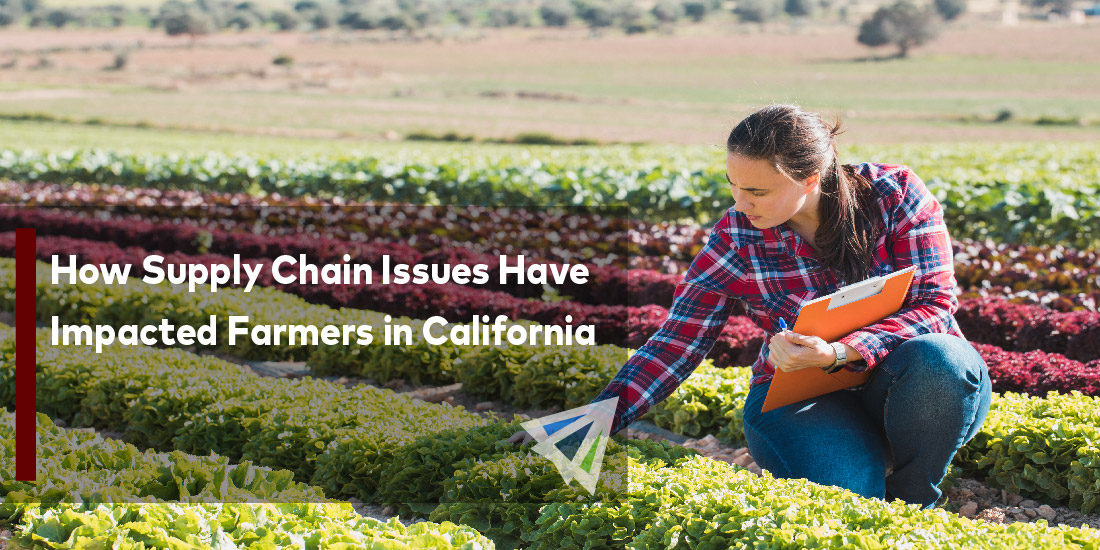How Supply Chain Issues Have Impacted Farmers in California
The customers have ordered. The farmers have grown, packaged, and stored the orders. But the international shipping industry is struggling to connect the gap, leaving farmers and buyers in a tough spot.
They receive the same news over and over—no containers are available, and vessels are completely booked. Even available vessels have insanely high transit times to account for the heavy congestion at destination ports.
In many cases, the inventory that farmers are stashing their warehouses with are already ordered products. Buyers have purchased the food, but farmers can’t collect the payment until the goods make it into a container and onto a ship.
Empty Container Crisis
Carriers have been making a lot of money amidst the international shipping crises due to the unprecedented demand, and much of their profits are coming from eastern Asia to the U.S. West Coast routes. And this route is what is causing the most pain to California farmers.
Usually, vessels bring in cargo to the southern Californian ports of Los Angeles and Long Beach, and then load up empty containers and ship them to Oakland where farmers reload the containers with crops.
As most know, ports are experiencing a crisis as empty containers pile up. There isn’t the time or resources for allocating equipment, trucks, and ships to redistribute empty containers. All hands are on deck simply to unload ships and berth the next. Containers continue to pile up on port grounds creating gridlocks and limiting the efficiency for trucks to move in and out of terminals to pick up loaded containers.
Farmers are now left to fend for themselves as they have limited options for moving their crops. Currently, more than 1.1 billion pounds of almonds from last year are sitting in warehouses awaiting to be shipped. The unfortunate aspect of agriculture shipping is that everything is on a clock. If it doesn’t make it out in time, you will never collect any profits and have to further deal with storage issues.
Contract Expirations
The other major issue with the current shipping market is that delays are so severe they are actually causing issues with expired contract prices. Farms and distributers that are locking in solid margin contracts with buyers are having their hand forced to reduce the price as delay times extend beyond contract periods.
What’s worse is that distributers often pay their growers shortly after the goods arrive at the port of origin, but they themselves don’t collect money until the product arrives at its final destination. Since delays are so extreme, distributors are paying millions of dollars to their growers before the product arrives at its destination, meaning they have to tap into their credit lines in order to pay farmers.
Essentially, distributors are paying more money than they have on hand, watching contracts expire and renegotiating even lower margins with buyers, and getting paid too late to compensate for upcoming shipments.
Potential Inventory Issues Ahead
As stated before, all crops and food products are on a clock. The unfortunate news that comes with worldwide shipping congestion is that it doesn’t just delay products from arriving—it can stop them all together (at least for a season).
Crops are seasonal and farmers have to maintain a steady schedule of growing, harvesting, packaging, and shipping in order to stay on track with the next years harvest. But with farmer and distributors’ warehouses full, ports in gridlocks, and the lack of empty containers and chassis, we may see some serious scarcities with certain foods.
Products that expire while waiting can’t easily be replaced by a new batch for an upcoming shipment. They have to wait till the next season, and that could leave buyers and grocery stores without their orders, and leave farmers and distributors at a financial disadvantage due to the lost business.
If you would like more information regarding this topic, contact our team at InterlogUSA and we will be happy to assist you on any questions or comments you may have! In addition, we have our weekly market updates that can provide you with relevant freight news, updates, developments across the industry, and more.
